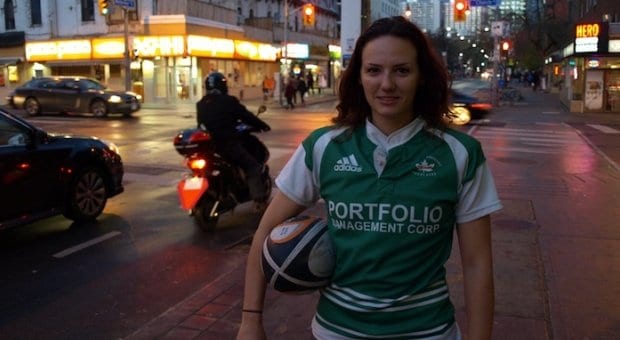After eight years in rugby’s Ontario Women’s League, Katrina Santilly is taking a leap to the big leagues. This January, the Toronto-based athlete is putting her life on hold to try out for the national team — of Brazil.
“In May, I learned I was technically able to play in Brazil because I am a Brazilian citizen,” says Santilly, a queer-identified player on the league’s 2013 championship team, the Toronto Saracens. After being caught in a round of layoffs at her job in August, she decided the timing was perfect to give the notion more serious consideration.
“I was a technical director in animation. I really enjoyed my job but am looking at it as a positive . . . I am never going to make the Canada team, [but] it’s still a growing sport [in Brazil] . . . I have a lot of dreams and a lot of hope.”
The team will hold tryouts in the spring. Santilly has arranged to move in with her cousin in São Paolo and has already lined up a club team and a roller derby team (yes, she’s a derby girl, too) to train with when she arrives.
In the meantime, she has been busy packing or storing her stuff, spending quality time with family and friends, and, of course, working out. She exercises five days a week, including three in the weight room. During the summer, when rugby and roller derby run concurrently, she spends four days a week at her various practices, often for several hours at a time.
“I also play softball recreationally, but I’m not very good at it,” she says over a pint at the Fox and Fiddle on Wellesley Street in Toronto. “I’m completely petrified of the ball . . . frankly, I’d rather be hit by a 200-pound girl. It’s a softer landing for the most part.”
The child of a Brazilian mother and an English father, Santilly grew up in Markham. She was exposed to rugby early through watching her dad’s matches.
“I grew up on a rugby pitch,” she says. “I knew when I turned 14 and was going to high school that it would be offered to me as a girl. There wasn’t [younger] girls’ rugby back then.”
That was 13 years ago. After high school, she followed further in her father’s footsteps by joining the women’s side of the Saracens — the same organization he played for on the men’s side. Being on an OWL club team is the highest level of play available for female rugby players in Ontario, the next step up being a national team.
In “15s” — also called rugby union — Santilly plays wing, a position at the edge of the field often occupied by fast and nimble players. In “7s” — a variant of rugby league — she plays hooker, a central position named for the way players drag the ball back with their feet.
The women’s Saracens won the league championship this year, as did Santilly’s other team, the Death Track Dolls of Toronto Roller Derby. After such a sweet year of victories, she says it’s especially hard to leave such close-knit units, noting she’s thankful to have been part of teams where being queer is simply normal.
“So many people I know [through sports] are gay or queer that we actually have to ask people if they’re straight, not the other way around,” she says, adding things seem to have changed a lot in recent years. “We had a really straight [rugby] team for a long time, but it was just that people didn’t feel comfortable coming out. Then about two years ago . . . everyone just seemed to suddenly be gay.”
But as someone who is unsure whether she would show an article like this one to her family, Santilly understands why some athletes might not want to put their personal life under the public microscope by coming out.
“Endorsements come from a lot of straitlaced companies that may not support an openly gay person,” she says. “You just don’t know how society will respond.”
Read about Olympic-medal-winning soccer player Erin McLeod, who says she hopes to be a role model for young girls in sport, in “Leading by Example.”
And read about retired Olympian and hockey gold medallist Sarah Vaillancourt, who says she never hid her sexuality from her teammates, in “I’m Into Girls and That’s Just How It Is.”


 Why you can trust Xtra
Why you can trust Xtra


